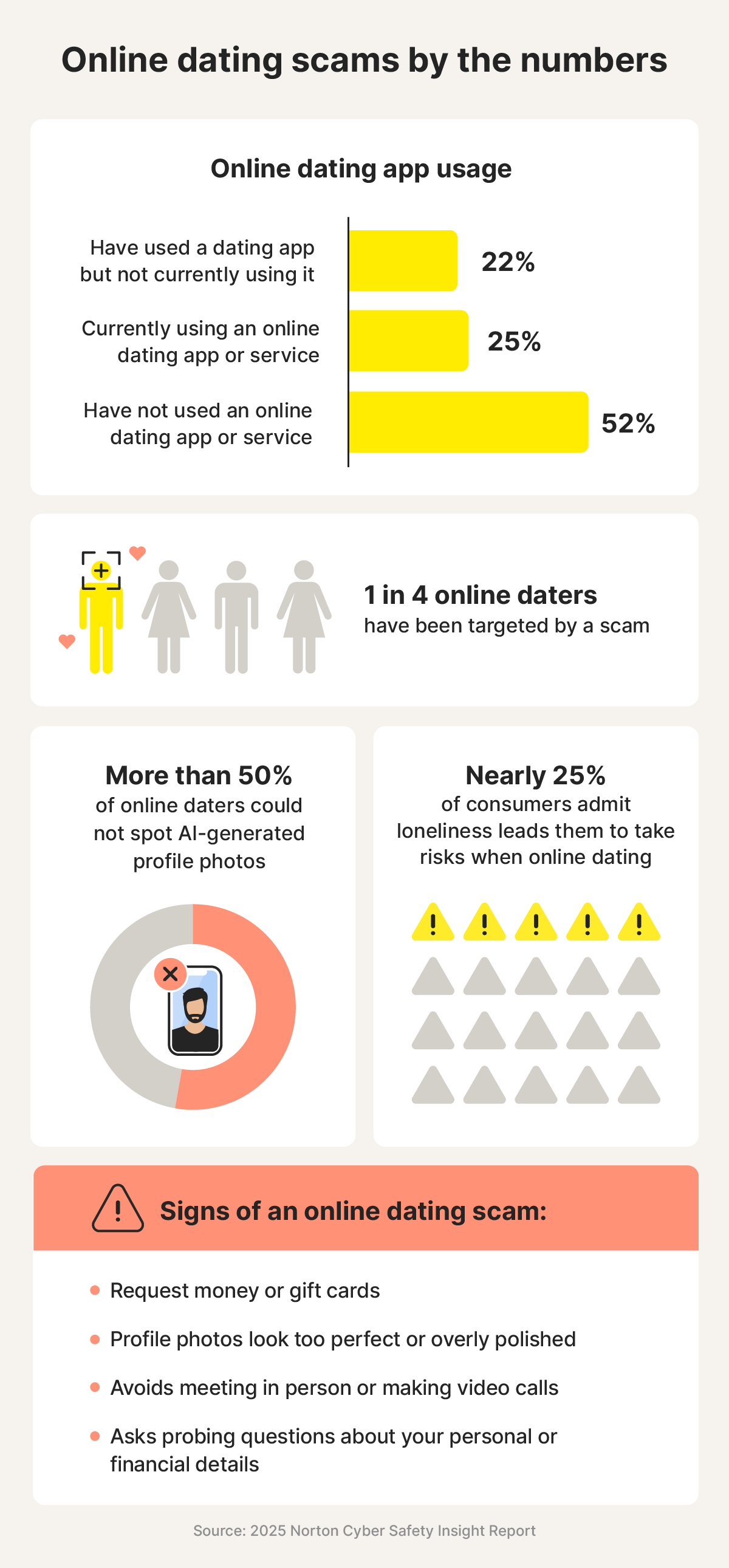Online dating scams are becoming more common — and more convincing. According to the 2025 Norton Cyber Safety Insight Report, one in four online daters say they’ve been targeted by a scam and less than half of them are able to tell the difference between a real dating profile photo and an AI-generated one.
In this guide, we’ll break down the most common dating app scams and share tips to help you spot the red flags before it’s too late. And, if you’re worried you’ve already fallen for an online dating scam, get tips on what to do next.
1. Catfishing
Catfishing scams involve someone creating a fake online identity to lure victims into romantic relationships. These scammers often steal photos of real people to appear more convincing or use AI-generated images to enhance their fake persona. Sometimes, they even impersonate celebrities.
Once they’ve gained their victim’s trust, the requests begin. Catfishers may ask for personal information, intimate photos, or money. But if you transfer money, the scammer will keep making excuses to get more funds before disappearing once the cash flow stops, leaving you feeling betrayed by someone you thought you had a genuine romantic connection with.
One French woman lost over €800,000 (equivalent to over $900,000) to a scammer who pretended to be actor Brad Pitt. The fraudster convinced her to send money for everything from customs fees for luxury gifts to fake medical treatments for kidney cancer.
Spot the red flag: Catfishers will say anything to avoid meeting in person or hopping on a video call. If someone constantly dodges showing their face, it’s a major warning sign that they might not be who they claim to be.
2. The scammer who’s sick or in jail
In this scam, the fraudster claims to be sick, injured, or in jail to prey on your empathy and ask for money. According to the Federal Trade Commission, these are some of the most common lies told by online dating scammers, with nearly one-quarter of romance scams involving one of these stories.
Scammers pressure victims into paying them by playing the “pity card” — taking advantage of their victims’ empathy — and then cut ties once they get what they’re after.
Spot the red flag: If someone you’ve never met in person suddenly has a medical emergency or gets into legal trouble and asks you to send money, it’s likely a scam.
3. Cryptocurrency and investment scams
Relationship investment scams, also known as pig butchering scams, involve fraudsters building online relationships to manipulate victims into putting money into fake investments. But the money doesn’t go into any real account or fund; it goes straight to the scammer’s pocket. And once you stop sending money or try to cash out, the scammer will likely disappear, along with your investment.
Some scammers spend weeks or months gaining a victim’s trust before bringing up the fake investment. That’s what happened to one Reddit user who met a romance scammer on the dating app Hinge. The scammer posed as a wealthy woman, video chatted several times, and even suggested trips together.
Eventually, she suggested investing in bitcoin to create a “travel fund.” But when the victim insisted they meet in person first, she abruptly canceled their plans.
Spot the red flag: Anyone you meet on a dating app who pressures you to invest in crypto, or any other opportunity that seems too good to be true, shouldn’t be trusted.
4. Military romance scams
Scammers posing as soldiers or service members often use fake profiles and stolen photos of real military personnel, or AI-generated images, to gain trust. These military romance scammers then form a romantic relationship, often claiming to be deployed overseas to explain why they can’t meet in person or video chat.
According to the Federal Trade Commission, once they’ve built a strong connection, scammers create urgent stories to ask for cash, such as needing money for medical emergencies or to file a “leave request” to visit you. After receiving the money, they typically cut off contact.
Spot the red flag: Members of the armed forces never have to pay to receive packages, meals, medical care, or take leave, so anyone claiming to need money for any of these reasons is a scammer.
5. Gift delivery scam
Also referred to as a “treasure box scam,” this scheme usually starts with an online dating scammer claiming to have sent you a luxury gift, sentimental item, or other valuable item. However, they then ask for money for customs fees or shipping costs. But if you pay, the scammer vanishes with your money, and the gift never arrives.
According to Quora, one person encountered the scam when their online boyfriend claimed to have sent them a gift box, but asked them to pay for fees through the courier company.
Spot the red flag: If someone surprises you with a gift but suddenly asks you to cover shipping or customs fees, that’s a major red flag.
6. Inheritance scams
In this variation of a romance scam, the scammer claims they’ve come into a large inheritance but need your help to access it. They might say they’re short on money for legal fees, travel expenses, or other made-up hurdles.
To convince you, they’ll often frame it as an investment in your future together. In reality, the only thing you’re “investing” in is the scammer’s bank account.
One Redditor shared that a colleague encountered this scam when a woman he met online said she needed to marry him to claim a $3 million inheritance. She asked him to pay $700 for a marriage license through a fake law firm website, promising he’d receive a share of the money once the inheritance came through.
Spot the red flag: Be wary if someone you’ve met online mentions a large inheritance and asks you to cover legal or travel fees. Inheritances don’t require money — or marriages — from strangers.


7. Scammers “working” on an offshore oil rig or ship
In this scam, a fraudster pretends to be working on an offshore oil rig or ship and builds a romantic connection with an easy excuse for never meeting in person. According to the FTC, about 6% of romance scammers use this lie to deceive victims.
Here’s how it usually unfolds: As your connection deepens, the scammer may begin making claims to gain your sympathy, like that they have poor internet and can’t make video calls or they can’t afford food. Eventually, they’ll ask for money, often saying it’s for a personal emergency or to cover travel costs so they can finally meet you in person.
Once they’ve gotten what they want, whether it’s a few hundred dollars or more, they usually vanish without a trace, leaving you heartbroken and financially drained.
Spot the red flag: Claims of working in a remote location like an oil rig or cargo ship, combined with excuses for not video chatting and sudden requests for money, are classic signs of an online dating scam.
8. Financial sextortion scams
Financial sextortion is a form of blackmail that occurs when a scammer on a dating app convinces you to send explicit photos, then demands money, gift cards, or other payment in exchange for keeping the images private. To pressure victims into complying, they often threaten to post the images online or send them directly to friends or family.
In one case, a scammer who pleaded guilty to 22 counts of sextortion, cyberstalking, and identity theft used the dating app Grindr to obtain explicit images consensually. He then threatened to publicly expose the photos unless victims paid him money or sent gift cards.
Spot the red flag: Requests for nude or explicit photos early in a conversation on a dating app can be a warning sign of a potential sextortion scam.
9. Money mules
Some scammers use online dating platforms to manipulate victims into becoming money mules — people who unknowingly transfer illegally obtained funds on someone else’s behalf.
According to the FBI, romance scam victims who are used this way are often considered “unwitting” or “unknowing” money mules. But even if you don’t realize you’re committing a crime by facilitating money laundering, you could still face legal consequences for helping to move stolen money.
Spot the red flag: If someone you met through an online dating platform asks you to receive money and then forward it to other people you don’t know, they may be trying to recruit you as a money mule.
10. Phishing scams
In this scheme, scammers try to trick you into revealing personally identifiable information like your Social Security number or answers to common security questions, which they can use for malicious purposes. Phishers may also send you to malicious websites that automatically download malware to your computer. Phishing is one of the most common scam tactics on the internet, with phishing attacks showing up in people’s email inboxes, text messages, and social media DMs.
On online dating platforms, phishers might casually ask about your mother’s maiden name or the name of your first pet under the guise of getting to know you, when really, they’re collecting data to hack into your accounts or steal your identity.
Remember to exercise extreme caution when opening links from strangers on the internet, even if they seem trustworthy. Be especially wary of profiles on dating platforms with links in their bios.
Spot the red flag: If someone is overly interested in seemingly random personal details, like where you were born or what your first car was, they could be running a phishing scam.
11. Code verification scams
In this scam, a fraudster tries to trick you into sharing a verification code, often from two-factor authentication (2FA), to take over your accounts. This tactic is commonly used to hijack email, social media, or even online banking accounts, which the fraudster then uses to access sensitive information, steal your money, or impersonate you to scam your friends.
Here’s how it typically works:
- A scammer contacts you, pretending there’s a need to “verify” your identity or profile.
- They trigger a legitimate verification code to be sent to your phone or email.
- They ask you to share that code with them. If you do, they can use it to launch an account takeover, possibly leading to identity theft or financial fraud.
Spot the red flag: Legitimate dating apps don’t ask users to verify others using codes. If someone claims you need to send them a code to “prove” you’re real, it’s almost certainly a scam. Most dating platforms handle profile verification internally, so look for an in-app verification badge instead.
12. Fake online dating sites
Some online dating sites are built entirely by scammers, or are overrun with fake profiles and bots to attract identity theft targets. These fake dating apps may ask for private details during sign-up, like your credit card info, or bombard you with messages from bots that try to lure you into scams. If you provide information, a criminal may sell it on the dark web or use it to steal your identity.
Spot the red flag: Be wary of any dating site that asks for highly sensitive data like your SSN or payment details before you can even sign up. Stick to well-known, established, and secure online dating platforms.
How to protect yourself from online dating scams
To avoid falling for an online dating scam, keep your personal information private and never send money to anyone you’ve only met online. Here are tips to help you stay safe:
- Never send money or gift cards: No matter how convincing their story is, don’t send money to a stranger, even if the person claims it’s an “emergency.”
- Keep your personal info private: Protect your personal information and never share financial details, passwords, your Social Security number, or any other sensitive data.
- Stay on the app: Many dating platforms have safety features that can detect sketchy behavior. If someone tries to move the conversation off the app too quickly, they may be trying to bypass these guardrails.
- Reverse image search their photos: Profile pictures that look a little too perfect might be stolen or stock images. A quick reverse image search could help you identify a scammer.
- Ask for a video call: Suggest a video chat before meeting up, especially if your budding relationship is long-distance. Excuses to avoid appearing on camera could mean your suitor is hiding their identity.
- Don’t click on suspicious links: Links someone sends you out of the blue could be phishing attacks or attempts to spread malware.
- Protect your account: Use a strong, unique password and enable 2FA. Never share your verification codes with anyone.
- Stick to reputable platforms: Use dating apps with strong safety features, like Tinder, Hinge, Bumble, or Match. Lesser-known apps may be poorly moderated or even outright fake.
- Take it slow: Scammers often push for emotional intimacy quickly to earn your trust — and your money. Slowing things down makes it easier to catch details in their story that don’t add up.
What is the U.S. government doing about romance scams?
In June 2025, the U.S. House passed the Romance Scam Prevention Act, a bipartisan bill that aims to combat online dating fraud. If signed into law, the bill would require dating apps to alert users if they’ve received a message from someone previously banned for fraud.
These alerts would include the banned user’s username, a warning that they may have attempted to scam others, and a reminder not to send money or share personal information. Apps would also need to provide tips for avoiding online scams and offer contact information for customer support.
Fell for an online dating scam? Do this next
If you think you’ve been targeted by an online dating scam, acting quickly can help protect your finances, accounts, and identity. Follow these steps to help minimize the damage:
- Report the scam on the dating platform: Most apps, like Hinge or Tinder, let you report users directly through the chat or profile. Reporting can help get scammers banned, preventing others from falling victim, too.
- Cut all contact with the scammer: Don’t try to negotiate or reason with the scammer. After reporting them, block them on the dating app and anywhere else they’ve reached out to you, like your phone number, email, or social media.
- Notify your bank or financial institution: Call your bank right away to report the scam. Bank representatives can help freeze your accounts, cancel cards, and monitor for suspicious activity.
- Update your passwords: Change the passwords for your dating account and any other potentially compromised accounts. Make sure to use strong, unique passwords for each one.
- Report the scam to the FTC: Go to ReportFraud.ftc.gov to file a complaint. You’ll get customized guidance for what steps you should take to protect your identity, and the FTC will use your reports to investigate and stop scams.
- Protect your identity: If you shared sensitive info, consider getting identity theft protection, such as LifeLock, to monitor for signs of fraud and help recover your identity if needed.
Protect your heart (and your identity) from the dangers of online dating
Online dating can open the door to meaningful connections, but it can also expose you to serious risks. Scammers may tug at your heartstrings just to steal your personal information and commit identity theft. That kind of fraud can damage more than your trust — potentially draining your bank account, hurting your credit score, and even affecting your ability to qualify for loans down the line.
LifeLock Standard can help you stay a step ahead of romance scammers with identity and credit monitoring, alerts about suspicious activity on your financial accounts, and dark web monitoring. Plus, if you fall victim, LifeLock’s U.S.-based restoration specialists will help you recover your identity, offering up to $1,050,000 in reimbursement for legal support, personal expenses, and stolen funds.
FAQs
Is online dating safe?
Online dating can be safe if you take precautions, such as using reputable sites, protecting your personal and financial information, and meeting in public places. However, staying alert to potential scams and other dangers is important.
Which dating site has the most fake profiles?
It’s hard to say which dating site has the most fake profiles, but older platforms with fewer security features may attract more scammers and bots. That said, fake profiles can pop up anywhere. Even more trusted apps aren’t immune, and scams exist on Hinge and other mainstream platforms.
How do scammers use AI to create more convincing fake profiles?
Scammers use AI to generate realistic profile photos, write smooth, personalized messages, and even clone the voices of celebrities or influencers. These tools help make fake profiles more believable and harder to detect.
Who’s most at risk for an online dating scam?
Anyone can fall victim to an online dating scam, but some groups are more frequently targeted. A study from the National Library of Medicine found that victims are often middle-aged, well-educated women.
Editor’s note: Our articles provide educational information. LifeLock offerings may not cover or protect against every type of crime, fraud, or threat we write about.
This article contains
- 1. Catfishing
- 2. The scammer who’s sick or in jail
- 3. Cryptocurrency and investment scams
- 4. Military romance scams
- 5. Gift delivery scam
- 6. Inheritance scams
- 7. Scammers “working” on an offshore oil rig or ship
- 8. Financial sextortion scams
- 9. Money mules
- 10. Phishing scams
- 11. Code verification scams
- 12. Fake online dating sites
- How to protect yourself from online dating scams
- What is the U.S. government doing about romance scams?
- Fell for an online dating scam? Do this next
- Protect your heart (and your identity) from the dangers of online dating
- FAQs
Start your protection,
enroll in minutes.
LifeLock is part of Gen – a global company with a family of trusted brands.
Copyright © 2026 Gen Digital Inc. All rights reserved. Gen trademarks or registered trademarks are property of Gen Digital Inc. or its affiliates. Firefox is a trademark of Mozilla Foundation. Android, Google Chrome, Google Play and the Google Play logo are trademarks of Google, LLC. Mac, iPhone, iPad, Apple and the Apple logo are trademarks of Apple Inc., registered in the U.S. and other countries. App Store is a service mark of Apple Inc. Alexa and all related logos are trademarks of Amazon.com, Inc. or its affiliates. Microsoft and the Window logo are trademarks of Microsoft Corporation in the U.S. and other countries. The Android robot is reproduced or modified from work created and shared by Google and used according to terms described in the Creative Commons 3.0 Attribution License. Other names may be trademarks of their respective owners.







